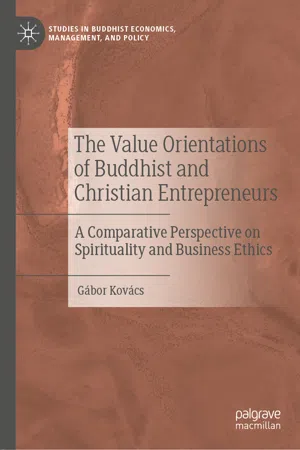1.1 The Applied Research Methodology
1.2 The Study Participants
1.2.1 Buddhist Entrepreneurs
1.2.2 Christian Entrepreneurs
1.3 A Concise Preview of Chapters and Research Questions
1.4 Some Concluding Remarks
References
This book is written as the summary of a decade-long academic and professional journey. I managed to complete my PhD studies by writing and successfully defending my doctoral thesis entitled “The Value Orientations of Christian and Buddhist Entrepreneurs” at the Corvinus University of Budapest. Shortly after, I had the chance to revise my dissertation into this monograph entitled The Value Orientations of Buddhist and Christian Entrepreneurs—A Comparative Perspective on Spirituality and Business Ethics. My main scope of interest, which determined my academic research direction and the final content of this book, was influenced by a deeply rooted source of personal motivation. I first came into contact with Buddhism in 1999. After a short intermission, I gradually became more and more engaged in both the theoretical and the practical aspects of the Buddhist tradition. Finally, I became a graduate student at the Dharma Gate Buddhist College in Budapest, which is the only state-financed Buddhist institute of higher education in Europe. Additionally, I also became committed to the study and research of business ethics and business spirituality in late 2006, when I first came into contact with the Business Ethics Center at the Corvinus University of Budapest. I have studied the conceptions of Buddhist economics extensively since that time. Finally, I am also aware of the fact that Christianity plays a fundamental and unavoidable role in shaping Western culture and those affected by it. Thus, I came to the decision to juxtapose these three fundamental components—namely, Buddhism, business ethics, and Christianity—into a research project whose outcome can be read in the pages of this book.
Comparing Buddhism and Christianity is not a newfangled phenomenon. In a book entitled Buddhism and Christianity: Rivals and Allies, Ninian Smart (1993) examines the similarities and differences between Buddhism and Christianity. He argues that comparing these two worldviews is especially interesting as Buddhism challenges the fundamental assumptions of both Christianity and the Western approach to religions. According to Smart, “[t]here is a gulf [between Buddhism and Christianity], a rather beautiful one as a matter of fact, and it cannot I believe be bridged” (1993, p. 25), as Buddhism in itself has a “strong non-theistic emphasis” which places it in opposition to the fundamentally theistic religion of Christianity. Making a similar comparison to that of Smart’s in the case of Buddhist and Christian entrepreneurs is a similarly challenging task.
Approaching the main subject of this book from a management perspective, I totally agree with Gordon R. Preece (1999) who argues in a paper entitled “Business as a Calling and Profession: Towards a Protestant Entrepreneurial Ethic” that the global economy is making historically unprecedented ethical and spiritual demands upon business leaders to engage in “moral business.” As business leaders are increasingly the stewards of civilization, they require a deeper sense of vocation, which provides a broader view of business. I argue in this book that spirituality and a spiritual value orientation can contribute to sustaining this deeper sense of vocation and embedding business into a moral framework.
The concepts of “value” and “value orientation” are awarded central importance in the argumentation of this book. Value is defined as an abstract ideal that organizes our systems of action in the form of standards concerning consistent behavior. The concept of economic value (about which a book by Phyllis Deane [1978] entitled The Evolution of Economic Ideas gives an exhaustive overview) is not closely related to the argumentation in this book, as the book applies a concept of value that should not be interpreted in a utilitarian sense as economic worth or exchange value. Both economic worth and exchange value are fundamental principles in business. They contribute to the cultivation of material values such as profit, wealth, status, and growth, which also organize our systems of action into a consistent behavior.
Spirituality (and religion) is one of the main value-formative factors of social practices. The beginning of scientific research into the former can be traced back to the middle of the twentieth century (see, for instance, Allport 1978; Rokeach 1973; Vernon and Allport 1931). Research aimed at exploring the role of spirituality in business and economics has become prevalent since the end of the twentieth century (Balog et al. 2014; Poole 2009). This book (i) argues that Buddhism and Christianity are different worldviews that incorporate values that influence economic and business behavior, (ii) explores empirical data to refine and extend the theoretical knowledge that exists in the field of business spirituality, and (iii) determines and examines the practices of Buddhist and Christian entrepreneurs. Sarah D. Dodd and George Gotsis (2007) argue that this field of inquiry—namely, business spirituality—is often couched within the framework of business ethics studies.
Louis W. Fry (2003) in a paper entitled “Toward a Theory of Spiritual Leadership” argues that spiritual leadership, which is identical to spiritually oriented entrepreneurship, is a field of inquiry within the broader context of business spirituality. He adds furthermore that findings in this area are mostly derived from Western religious theology and practice and leadership ethics and values. This book centers its argumentation around Buddhist philosophy and values, thereby broadening the perspective of the field of business spirituality with an Eastern approach.
Angela M. Balog et al. (2014), in a paper entitled “Religiosity and Spirituality in Entrepreneurship: A Review and Research Agenda,” review the corresponding literature about the field of business spirituality, focusing on the issue of entrepreneurship. They refer to many pieces of work by numerous scholars when they argue that spirituality contributes to, inter alia, improved organizational performance and higher profit; greater organizational honesty; improved individual creativity and intuition; elevated psychological well-being, life satisfaction, physical health, and self-realization; and more effective decision-making. This book does n...
